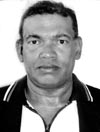
Bernard - One of the best all rounders produced by KandyBernard Perera, who was part of the Sri Lanka squad for the inaugural test, the test against India that followed and the three test series in Pakistan, was twelfth man in all five matches without actually making it to the playing eleven. A solid middle oder batsman and a purveyor of off breaks, he was dynamite on the field. Bernard Captained the Katugastota Anthonians in all the age groups and played for the first eleven from 1973 to 1976. His elder sibling Bede played alongside him for three years. The match against St. Benedicts on home turf in 1975 sticks in his memory. The Pereras batting in tandem took the score from 6 for 3 to 256-3. Bernard's contribution was 140 and Bede's 110 - both unbeaten! Throw in some forty odd wickets and brilliant work on the field and it was no surprise that Bernard was the Bata/Observer Schoolboy Cricketer of the year in 1976. His centuries that year against Kingswood, St. Sulvesters, St. Benedicts and a big match 155 not out against Trinity helped him to also clinch the Times outstation Schoolboy Cricketer award. The main award, by the way, was won by Nalandian Yohan Gunasekera.
Fresh from school, Bernard threw in his lot in with the CCC, playing under Michael Tissera and Shanthi Pieris. He confesses that he learnt a lot from Tissera. From 1980 to 1982, it was his home town club Kandy CC that benefited from his services. He had also moved from Maharajas to Ceylon Tobacco Company, and it was for the latter that he played in Mercantile Cricket. By now, Sri Lanka had gained Test status and the inaugural test against England was coming up. To press his claims, Bernard scored centuries in both test trials. Further manifestation of his class came when he made an unbeaten 56 and put on 166 with Ranjan Madugalle in a Board XI three day match against Keith Fletcher's England side at the newly developed Asgiriya Stadium. He may have been batting well and scoring runs, but Bernard didn't fancy his chances of making it to the test team. Dejected and frustrated Bernard decided to join the rebel tour (AROSA), organized by Tony Opatha and Captained by Bandula Warnapura. Financial considerations, though not unimportant, were secondary. His batting skills found expression in South Africa, too. Bernard had a hundred in the unofficial test, two nineties and four fifties. The late Anura Ranasinghe scored a one day Century, while Flavian Aponsu and Gerry Woutersz (both of whom had not played in tests) were the other successes with the bat. The tour was an unmitigated disaster as the rebel team were soundly beaten in all four unofficial tests and the three one-dayers. Bernard recalls a particular limited over game in which the Sri Lankans had made 275-6 and were feeling pretty good. Quite soon they were brought down to earth as the might of the South African batting passed the total for the loss of three wickets with around 10 overs to spare. The visitors had their first experience of day-night-games on this tour. Peter Kirsten and the South Africans who had in their ranks the legenday Graeme Pollock, Ray Jennings (the stumper who later became a slightly controversial Coach of the national side) and placemen Steve Jeffries, Garth Le Roux and Vince Van Der Bijl. Apartheid, or colour bar as it was termed, meant different buses for blacks and whites, different compartments in trains, different rates for doctors. The Sri Lankans didn't really encounter Apartheid because they didn't use public transport. As for player interaction, Bernard says it was good. The Captain Peter Kirsten, particularly, was extremely friendly. One of the unfortunate aspects of the tour was the sad dip in form for Ajith de Silva. Bernard and company were banned for twenty five years for their unscheduled expedition. However, on appeal to Sports Minister Nanda Mathews, the ban was reduced to ten years. There was no turning back, and Bernard played for old Anthonians in Division three cricket before finally hanging up his boots. Taking to coaching, he was mentor to the Trinitians from 1995 to 2000. Sangakkara was his first captain and Kaushalya Weeraratne Captained for two years. One of Kandy's district coaches, Bernard is surprised by the fact that Kandy, the all island provincial champions, have only one player in Sri Lanka's under 19 playing eleven. He laments the fact that the bulk of Kandy's cricketers, at both school and club level, lack turf facilities for practice. Viewed in this light, the proposed gym at the Pallekele Complex will certainly be a boon to Kandy's youngsters. - AK |
|| Front
Page | News | Editorial | Columns | Sports | Plus | Financial
Times | International | Mirror | TV
Times | Funday
Times | Kandy
Times || |
| |
Copyright
2007 Wijeya
Newspapers Ltd.Colombo. Sri Lanka. |
